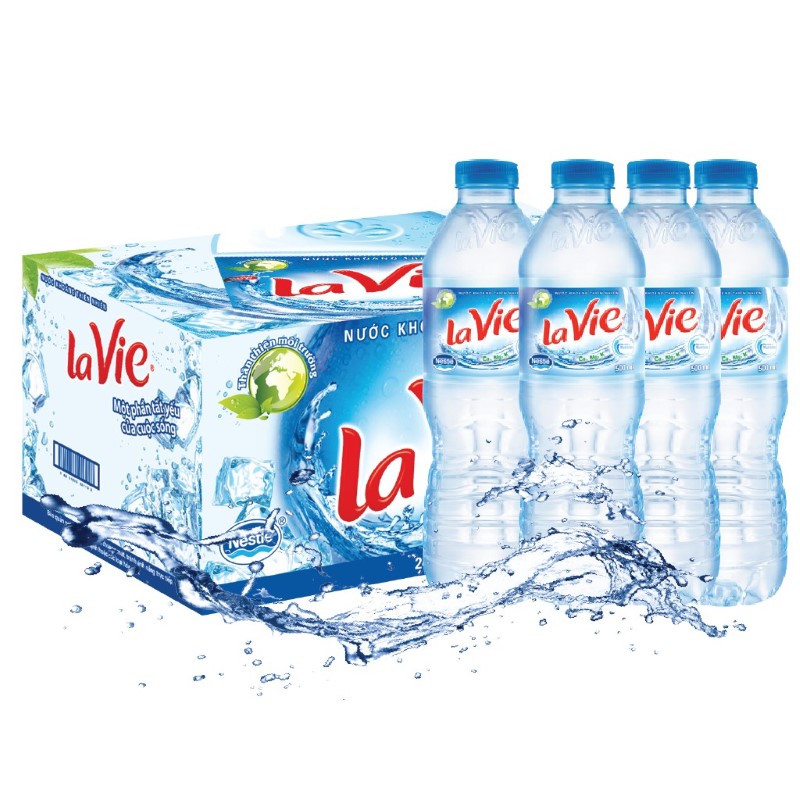La Vie – Unit interested in developing circular economy
The movement
Since May 2018, La Vie has started to stop using shrink film on bottle caps because this is a plastic part that is difficult to collect and recycle.

In September 2019, the bottles of La Vie natural mineral water products 350ml, 500ml and 1.5l were changed from light blue to clear white to make recycling easier.
Next, La Vie launched a product using glass bottles and invested in a process to collect and completely recycle bottles after use. This is also one of the first businesses in Vietnam to launch a 19-liter bottle, a bottle that can be reused many times.
Not stopping yet, La Vie launched a natural mineral water product line using recycled food grade plastic bottles (rPET). La Vie is also the first mineral water brand in Vietnam to use bottles made from recycled plastic. This move is considered the start of a circular economy model for packaging. Using bottles made from recycled plastic is a great effort of La Vie in its long journey to promote a circular economy in packaging.
Recycled plastic (rPET) created from PET bottles is a very important link. The recycling process to create rPET is very strict to meet the hygiene and safety standards of the food and beverage industry.
The way La Vie does it is to use recycled plastic used for food, specifically 50% rPET plastic bottles, meaning 50% of the plastic to create this bottle is not virgin plastic. This means that not only can we reduce the amount of new plastic by 50%, but we can also collect and recycle the equivalent amount of plastic currently in the environment for continued use.
The initiative to use rPET plastic is part of the plan to achieve the goal of 100% recyclable and reusable product packaging by 2025 of La Vie Company and Nestlé Corporation. This goal comes from the vision: None of the Group’s packaging becomes waste after use.
Challenges
It took La Vie several years to realize the process from idea to recycled plastic bottle product. Product quality is always La Vie’s top priority. All products must comply with Nestlé’s set of standards applied uniformly globally, with strict and continuous testing through many steps.
Product samples are sent to research laboratories in Europe approved by Nestlé headquarters in Switzerland, while still having to meet the regulations of regulatory agencies in Vietnam.
In addition, the price (cost) of recycled plastic bottles is 30-50% higher than bottles made from virgin plastic. This reduces La Vie’s business profits, but La Vie is still determined to implement and act according to plan.
When La Vie’s products made from recycled plastic were launched on the market, many customers showed interest, especially young people. But besides that, there are still mixed and unsupported opinions. But La Vie still courageously shows and proves it with product quality.
Goals and ambitions
From a practical business perspective, Mr. Fausto Tazzi – General Director of La Vie Company said: “To have a truly effective EPR – extended producer responsibility mechanism, it is necessary to build a logistics packaging chain (from the time the packaging is produced to the post-use phase) with the participation of all stakeholders, including manufacturers, retailers, consumers, waste collectors and recycling enterprise. Once this chain is well controlled, it will ensure the quality of waste, so that after-use packaging can become high-value raw materials, continuing to return to the production cycle instead of being discharged into the environment. create a circular economic model”.
He also said: “As a natural mineral water company, we are aware of our role and responsibility in ensuring sustainability for nature. Therefore, we are very passionate about protecting water resources, and reducing plastic waste and carbon emissions” and: “At Nestlé and La Vie, we understand that sustainable development is not enough, so we are embarking on a journey towards environmental regeneration. We aim to contribute to a positive impact on the environment and society, to help preserve the ecosystem, regenerate and restore the environment for today and future generations.”
And General Director of Nestle Corporation, Mr. Mark Schneider said: “Waste plastic is one of the major problems affecting environmental sustainability that the world is facing today. Solving this problem requires a holistic approach. We are committed to finding better solutions to reduce, reuse and recycle packaging. Our ambition is to recycle and reuse 100% of product packaging.”
La Vie has joined forces with other “big players” in the beverage and packaging industry to establish the Vietnam Recycling Alliance (PRO Vietnam). PRO Vietnam’s goal is to create a system to collect, classify, and recycle, ensuring that packaging sent to the market will not be discharged into the environment or put into landfills.
Hopefully, with the initiatives and specific actions that La Vie has been implementing, will not only contribute to creating motivation to promote the circular economy model in Vietnam but also help customers raise awareness. Protect the environment, protect a greener – cleaner – more beautiful earth.












